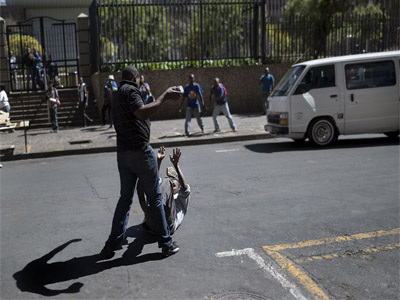
NO fewer than 5,000 people have taken part in a rally against xenophobia in South Africa’s coastal city of Durban following attacks on foreigners.
President Jacob Zuma condemned the violence which has claimed at least five lives, as “shockin”“, and called for calm to be restored.
The Zulu king has been accused of fuelling the attacks. He denies this.
Many jobless South Africans accuse foreigners of taking thier jobs in a country where the unemployment rate is 24 percent.
“No amount of frustration or anger can justify the attacks on foreign nationals and the looting of their shops,” President Zuma told parliament on Thursday.
Protesters marched through Durban chanting “Down With Xenophobia” and “A United Africa”, led by the city’s mayor and the premier of KwaZulu-Natal province.
Marcher Vanessa Govender told the BBC: “It’s just a mammoth show of support for all those foreigners who have fallen victim to the past two weeks of xenophobic violence.”
As the march was held, anti-immigrant protesters clashed with police, but were reportedly dispersed by water cannon and pepper spray.
The latest wave of violence against foreigners erupted in the Durban area before spreading to other parts of the country.
In Johannesburg on Thursday, police fired tear gas and rubber bullets at a crowd chanting anti-immigrant slogans after attacks on foreign-owned shops. Dozens of migrants sought refuge in a police station.
Malawi has said it would evacuate its nationals from South Africa and Kenya says it is preparing to do the same. Mozambique has set up border camps to cope with the exodus of its citizens.
Foreign-owned shops were forced to bring down the shutters because of skirmishes earlier in the day.
Many foreigners, mostly from other African states and Asia, moved to South Africa since white-minority rule ended in 1994. At least 62 people died in xenophobic attacks that swept South Africa in 2008.
South Africa has expressed regret following xenophobic attacks targeting mostly African migrants in the country, says Home Affairs Minister, Malusi Gigaba.
Gigaba says President Jacob Zuma has constituted an inter-ministerial committee which includes security and immigration officials, with the task of resolving the violence against foreign nationals.
Zuma appealed for calm after officials said about 116 alleged masterminds of the violence have been arrested.
“No grievance or concern is enough to justify acts of criminality and violence against foreign or even South African nationals. And so, we are determined to stamp this violence out and ensure that people can live in peace in South Africa,” said Gigaba.
“On the other hand, where there are genuine grievances among South Africans, particularly of an economic nature, as well as social services, we will address those so that we can remove the powder keg, which can be used by criminals opportunistically to instigate violence and to cause violence against foreign nationals,” he added.
Gigaba said Zuma’s call for calm was timely, adding that the government has set in motion plans to prosecute and punish those found guilty of xenophobic attacks.
He said Pretoria has engaged the African diplomatic corps to brief them about the administration’s plans to help the victims as well as end the violence.
“We have visited the displaced people in the shelters. We’ve spoken to them and expressed our regret and assured them of our government’s intention to deal decisively with the situation to ensure their reintegration.
“We’ve also reassured those who wish for voluntary repatriation that we are going to assist them towards their safe return to their home countries,” Gigaba added.
Victims of the violence say they were attacked because they are African migrants. They expressed surprise about the attacks since many African countries helped black South Africans in their struggle against the apartheid white minority rule.
Gigaba agreed, but added that other nationals as well as some South Africans were also attacked.
“All of these incidents undermine our efforts towards greater integration in the African continent and it undermines our efforts towards building a peaceful correlation with our African neighbours, and the peace efforts our government has been involved with on the African continent,” he said.
Meanwhile, influential Zulu King, Goodwill Zwelithini has been accused of stoking xenophobia after he was quoted as saying foreigners should “pack their bags and leave.”
He was widely quoted as saying last month that foreigners should “go back to their countries”. However, he said his comments had been distorted.
“As I speak to you, you find there are unsightly goods hanging all over our shops,” a transcribed quote from Zwelithini published by South Africa’s Eyewitness News reads. “They dirty our streets. We cannot even recognise which shop is which. They are all blocked by foreigners.
But Gigaba said the king denied the reports after the inter-ministerial team met him. The king has since appealed for calm and an end to the violence.
In the days before the peace march in Durban, more than 2,000 foreigners fled to camps erected on sports fields around the city, afraid to return home, according to Gift of the Givers, an aid organization.
In the city of Durban along the Indian Ocean, one of Zuma’s wives, Thobeka Madiba-Zuma encouraged thousands who had participated in a peace march.
The U.S. Ambassador to South Africa, who was born in the then Zaire to Haitian parents, spoke in defense of the immigrants.



